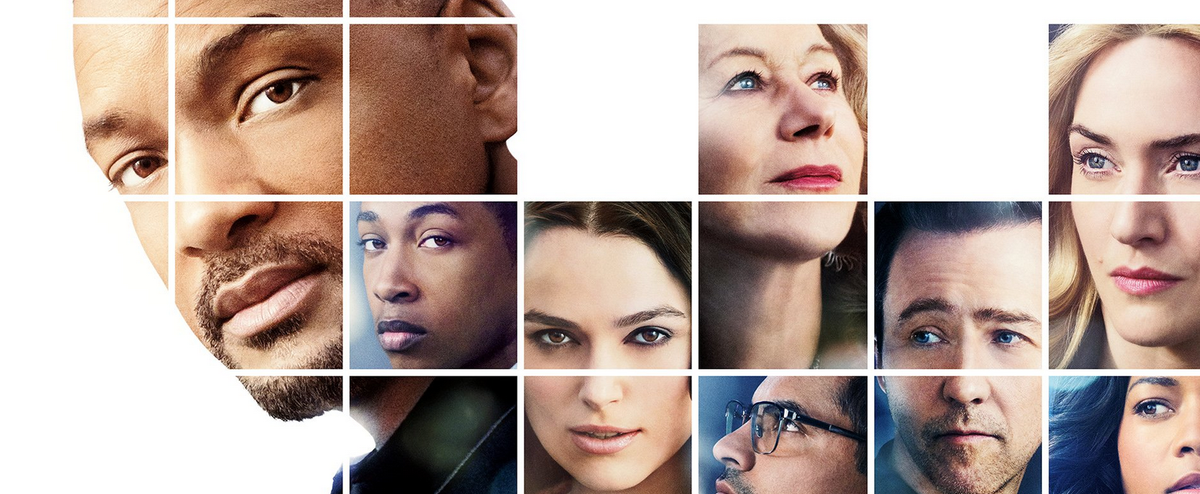Unhappy Endings
You've sat through 95% of the story and are giddy in expectation of the amazing finale! Which might never come, because endings are hard.

My wife and I enjoy many activities together. Yes, I know that sentence could be interpreted in the vulgar way, and that’s fine. But this is Breadcrumbs, where carnal matters are left undiscussed. Instead, I want to talk about a bad movie my missus insisted we see at the cinema.
I checked it out. Ooh, good cast. Will Smith, Edward Norton, Keira Knightley, Michael Pena, Kate Winslet, Helen Mirren. Sure. Why not? We booked tickets and turned up for our screening of Collateral Beauty.
It’s the cheerful tale of how Smith’s character is failing to deal with the death of his daughter in a healthy way. His friends are worried about him and his behaviour is costing his business clients. They decide to hire three actors to confront Smith on his beliefs about love, time and death for some reason which may have made narrative sense to the writers and producers but I don’t recall it.
And, for some reason, the writer and directed decided this is where they should turn the cheese machine to overdrive. Pena’s character, who is dying of cancer, gets to work with the actor dealing with death. Winslet, desperate for a child with the alarm about to ring on her biological clock, is assigned time. Norton’s character has difficult relationships with his wife and daughter because he’s cheated on said wife. He gets love.
When all this gets revealed, my eyes rolled hard enough to climb Everest. Partly because of the desperate grasping for profundity, and partly because coincidence is the driver of this plot. Who would have guessed that the friends each secretly needed the exact thematic help they were trying to give Smith?
Yet, as forced and cheesy as that was, the film could have been rescued. The cast is solid, the director competent, but I hate coincidence as the prime mover in the story. It’s dumb. It reduces characters to cogs in a machine. The engines of reality rev up and thrum and, oh gosh, a plot twist happened. But this Breadcrumbs isn’t about coincidence. Worse is yet to come. I’ll gloss over the subplots where the three friends come to terms with their crises and hurray! Everything will be OK. I’ll ignore the minor revelation regarding Death and Smith’s wife. What really soured me on this movie was its very final scene, when Smith and his wife, now reconciled, go walking through Central Park, under a bridge where the three actors watch them. Then Smith turns and sees them on the bridge and before his wife can notice them, they disappear. They were angels all along.
UGGGGGGGHHHHHHH.
Look, it’s fine to go out and make a message movie to uplift the benighted souls of your fellow man. Creatives the world over just love to dump some kind of greater moral lesson into the story, as if the events or themes of the story weren’t clear enough. But the ending! The ending to Collateral Beauty shat all over the central premise of the story, that humans are foolish, weak and vulnerable, but still redeemable, by making the redemption arcs for all four characters be divine in origin. Way to stamp all over your audience’s sense of satisfaction, guys.
No, this Breadcrumbs is about how a botched conclusion robs your audience of the emotional high that comes from a great ending. It’s not as if your ending needs to be relentlessly upbeat. It should resolve all the plot strands. It should fit the central conflict of the main characters. For example, Leon. Downer ending. Leon sends Matilda away and chooses to fight off the cops who are attacking. There’s a thrilling, brutal, sustained action sequence and it looks like Leon will escape, just like Matilda, except… The bad guy Stansfield shoots him in the back. It’s sad – sadder than you would expect the death of an assassin to be. But the movie succeeds in humanising Leon and demonising Stansfield. But then…
Stansfield rolls Leon over and Leon hands him a small metal ring. This is from Matilda.
It’s a hand grenade pin.
Leon is festooned in hand grenades.
Boom. Instant catharsis. Awesome ending. Although Leon dies, it fits. It’s satisfying. The bad guy gets got in a satisfying way. Leon stuck to his moral code, sacrificed himself to save someone, and got to put down roots. Matilda got her act of fatherly love.
Another example of how-not-to comes from the mid-2000s Nicolas Cage movie, Next. It is a thoroughly silly film about an illusionist who has the ability to rewind time. He can make a decision and see how it turns out. And if it goes wrong, he can simply reset himself like using a save state in a video game emulator. It’s a fun conceit. It isn’t terrible gimmick at all.
Cage is employed by the CIA or whoever to investigate a terrorist group. The film has fun showing us how Cage uses his power to investigate and foil their plot. And this is where the writers started falling on their arses in trying to be clever. I think they wrote themselves into a corner. Victory is supposed to be difficult, but by the end of the movie, it’ll turn out to be super easy, barely an inconvenience. So, they throw a twist at us. Cage fails to find the bomb, and it goes off. And the good guys lose. Except... I didn’t see it coming. I should have seen it coming.
In a story where the protagonist can cheat by going back in time, the biggest betrayal possible would be to have the hero rewind the entire story, thereby wasting the audience’s time completely. And that’s exactly what the writers did. Faced with the detonation, Cage rewinds the movie to his first meeting with his handler. And now he knows exactly where the bomb will be. I sat fuming at the cheapness of the ending.
So that’s the Breadcrumb from Collateral Beauty, Leon and Next. The ending of the story should feel earned and fitting, especially in mainstream movies and books. People will have spent considerable time with your story, especially if it’s a novel, and will expect some kind of satisfaction or catharsis. It behoves writers to supply it. Readers and viewers can tolerate shoddy prose, cough Dan Brown cough, or poor acting, or rancid dialogue, but they won’t tolerate being cheated out of a final moment of satisfaction.



